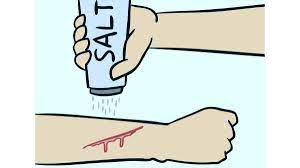---------oOo---------
Byter Sue P sent me an email:
Hi Otto!What does it mean if you are salty with someone and where did that phrase originate?Does it have anything to do with "salties" salt water crocodiles being a bit snappy?Regards, Sue
Thanks for the email, Sue, some comments about saltiness below, plus more.
---------oOo---------
According to Dictionary.com, the meaning of salty can be various:
1. tasting of or containing salt; saline.
2. piquant; sharp; witty.
3. racy or coarse:
salty humor.
4. of the sea, sailing, or life at sea:
salty tales of adventure on the high seas.
5. Slang. (especially of a sailor) toughened by experience:
proud and salty Marines.
6. Slang. angry, upset, or hostile, especially due to embarrassment or failure:
He gets all salty whenever he loses.
The comments below address the slang meaning of irritated, angry, or resentful, especially as a result of losing or being slighted. Apparently Gen Z uses it as a term for jealousy.
---------oOo---------
“Salty”:
- The original sense of something containing salt, often used of water, is first recorded in the 1440 Latin-English dictionary Promptorium Parvulorum as a translation of the Latin salsus, which means both "salty" (tasting of salt) and "salted" (covered or preserved in salt).
- Although it was often used of water, the term ‘salty’ was not applied to the ocean until several hundred years later. Salty sea appeared as a fixed phrase in the 1800s, and by the late 1800s, salty was being applied to various aspects of naval life and culture. These were the days of sailing ships with sailors coming to be referred to as ‘salts’, both from exposure to the brine (especially in storms) and from being covered in dried salt as a result of the exposure.
- One noted aspect of sailors was their language, soon salty came to refer to racy or crude language. One newspaper reported in 1879 that a Sea Captain had denounced a physician in printed handbills and that salty language had been used.
- Thanks to sailors' propensity to spout off profanely and suddenly, in African American swing situations ‘salty’ came to then refer to explosive anger. An early example is in the phrase jumping salty, meaning "to get angry easily," appearing in the gossip columns of black newspapers:
WE'D LIKE TO KNOW: Why ... Phil Marshall "jumps salty" on Jamaica fellows.... (New York Age, 12 Dec. 1936) Jumping Salty was even the name of a 1936 song by Ricky Simpson.
- It continued in primarily African American use through the 20th century:
"I don't know why, but he's changed an awful lot lately—come jumping salty with me when I was back here. Next time he buzzes into me, I'm going to try his head. He's a big skipper all right—but he aint [sic] too big to fall."— William H. Jones, The Triangle's End, 1954
- The jump has dropped away, but the "angry" salty remains.
---------oOo---------
Some more salt . . .
---------oOo---------
“Worth his salt”:
The phrase originated with the ancient Romans, who valued salt highly. Over time, salt has often been associated with good things, because of its health benefits and great value. Ancient Roman soldiers were paid with special money that could be used to purchase salt. This special money was called salarium, from which we get our modern word “salary."
---------oOo---------
“Take it with a grain of salt”:
- The phrase is typically said "with a pinch of salt" in British English and said "with a grain of salt" in American English.
- The origins of the phrase aren’t clear. One theory is that it originated in ancient Rome in 77 A.D. from Pliny the Elder. It is believed that he used the phrase when translating an antidote for poison, saying to take the antidote with a grain of salt. That could be a reference to the fact that food is more easily swallowed if taken with a small amount of salt. It should be just a grain because too much salt is in itself poisonous.
- The meaning that truth may require moderation by the notional application of 'a grain of salt' entered the language much later, influenced by classical scholars' study of Ancient Greek texts like the works of Pliny. The phrase has been in use in English in this sense since the 17th century; for example, in the English religious commentator John Trapp's Commentary on the Old and New Testaments, 1647: "This is to be taken with a grain of salt." What Trapp meant by that citation isn't entirely clear but it is possible that he wasn't intending to convey the modern day meaning of skepticism.
- The expression didn't emerge again in print for a couple of centuries, in the early 20th century and in America.
- The 'pinch of salt' variant is more common in the UK, the earliest printed citation being F. R. Cowell's Cicero & the Roman Republic, 1948:
"A more critical spirit slowly developed, so that Cicero and his friends took more than the proverbial pinch of salt before swallowing everything written by these earlier authors."
---------oOo---------
“Salt of the earth”:
You are the salt of the earth, but if the salt has lost its
flavor, with what will it be salted? It is then good for nothing,
but to be cast out and trodden under the feet of men.
— Matthew 5:13, World English Bible
During Jesus’ ‘Sermon on the Mount’, he told the fishermen, shepherds and workers, “You are the salt of the earth.” Salt was very valuable then, so Jesus was literally calling them worthy.
Another interpretation is that at that time, salt was most used as a preservative. Hence the reference to salt is as a preservative, therefore seeing the duty of the disciples as preserving the purity of the world.
---------oOo---------
“Rub salt into the wound”:
During the earlier centuries, when England was establishing its navy, most sailors were forced into service. While at sea, punishment was often lashes with a cat'o'nine tails. These whippings would almost always break the skin, and salt was rubbed into the wound to prevent infection, although it also made the wounds more painful.
---------oOo---------
Needs some more salt . . .










No comments:
Post a Comment
Note: Only a member of this blog may post a comment.